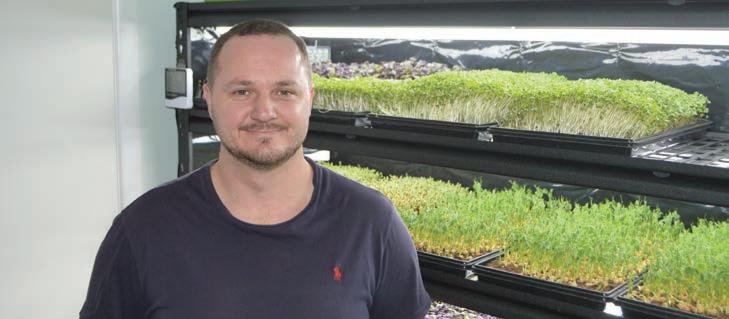
4 minute read
TomatoesNZ Inc
TOMATOESNZ AGM AND SPEAKER EVENT
Dinah Cohen : TomatoesNZ business manager
Growers and industry joined TomatoesNZ for its AGM in Pukekohe on 17 August
Growers and industry joined TomatoesNZ (TNZ) for its Annual General Meeting (AGM) which was held online and in Pukekohe on 17 August.
The AGM saw the election of Ben Smith to the board, approval of the 2022–23 budget and recognised the service of Malcolm Pook, who was awarded TNZ life membership for his services to the board and his 50-plus year career as a tomato grower. There was positive feedback on the speakers who shared their knowledge either as growers or as leaders in their field of energy. T&G general manager of undercover crops, Ben Smith, spoke about his experiences of dealing not with one but two possible biosecurity incursions in the same crop over a couple of months. This unfortunate coincidence did have some positive outcomes though, with Ben saying how quickly and efficiently the Ministry for Primary Industries (MPI) response team worked in the first few weeks after identification. He also mentioned how helpful both Helen Barnes (former TNZ general manager) and Barry O’Neil (Horticulture New Zealand and TNZ Chair) were in leading the communications on behalf of growers with MPI. Grower2Grower managing director, Stefan Vogrincic, spoke about all the different elements to consider when planning the perfect irrigation system for crops. From substrates to delivery, water temperature and quality, to the active climate. There are many factors to get right and even with monitoring it can be hard to judge if the plants are getting the perfect amount of water. To monitor plant stress in a manner audible to humans, plant responses can be translated into electrical signals to clarify what is going on. The use of the latest technology can be extremely beneficial. Geological and Nuclear Sciences Limited (GNS) socioeconomic policy specialist, Celia Wells, delivered the latest research and development from GNS, in particular, using ground source heat pumps as a sustainable way of heating commercial greenhouses. She also told attendees about research into capturing CO2 which does not involve
heating – rather, directly capturing CO2 from the air. For more information about either piece of research, contact Celia directly: c.wells@gns.cri.nz Apricus NZ Eco Energy managing director, Marcus Baker, concluded the talks with an overview of how ÖkoFEN pellet boilers work and the costs involved. For more information, contact Marcus: marcus@ecohotwater.co.nz Unfortunately, we ran out of time to hear from Gerard Dobbs from Nature’s Flame, a supplier of wood pellets in Taupō. You can watch their short video on how wood pellets are created here: www.naturesflame.co.nz/
woodpellettv.html
If you would like a copy of Stefan, Celia, Marcus or Gerard’s presentation, please email dinah.cohen@hortnz.co.nz
Key concerns from TomatoesNZ
TomatoesNZ has been working with growers to identify the main issues they currently face. This information is being used to put together a document that we can present to government delegates and policy makers so that we can focus their attention on what really matters to growers. If you would like to contribute to this living document, please download it from our website: www.tomatoesnz.co.nz/
latest-news/key-concerns-from-tomatoesnz
or email Dinah for a copy: dinah.cohen@hortnz.co.nz
United Fresh Technical Advisory Group – update on crate hygiene
In July, AgriChain Centre managing director, Anne-Marie Arts, updated the Technical Advisory Group (TAG) on hygiene for returnable plastic crates (RPCs). This is a culmination of research and other work completed over the last few years. The webinar is free to watch at the United Fresh website (17-minute mark):
www.unitedfresh.co.nz/technical-advisory-group
Key take aways:
• Using the right cleaning products at the right concentration is important, but cleaning across the whole chain of movement is crucial. This includes both for external returnable crates and internal crates which travel between greenhouses and from production sites to packhouses and to Farmers’ Markets. • Sometimes internal crates are used as temporary rubbish bins as produce is sorted and graded. Internal crates need to be washed to the same standards as external RPCs. Growers should also have a standard operating procedure for handling their crates within their sites.
The document referred to in the webinar, which pulls together all of United Fresh’s research on crate hygiene, can be downloaded here:
www.unitedfresh.co.nz/assets/TAG/United-FreshResearch---Knowledge-Compilation---RPC--June-2022.pdf

Malcom Pook received the TNZ life membership award
Final reporting from Lincoln University whitefly study
Based on the research undertaken at Lincoln University into pest incursions such as whitefly, a statistician has developed the following advice as a suggested protocol for identifying the overall strength of infestations: • Score number of whiteflies per plant (see opposite for an example scale). • Take 50 samples that are representative of the glasshouse. – These samples can be individual plants. – Find a convenient way to collect samples. – Make sure your sampling is representative of the entire glasshouse. – Since outbreaks can grow rapidly, it is good to sample often, for example, once a week. • The first few samples are most important. There will be diminishing returns for additional samples. Charts in section 1 show how much variability to expect for the average score of your sample. This variability depends on the average score.
Level Whitefly numbers 0 0 1 <5 2 6-10 6 11-15 8 16-20 10 >20
ALT website resources
’A Lighter Touch’ (ALT) has a range of resources available for growers on their website including recordings of previous webinars:
https://a-lighter-touch.co.nz/category/resources
Residue Compliance Booklet – 2022 updates
This document has been updated with current compliance for fungicides and insecticides. TomatoesNZ has emailed this to all growers but if you would like a printed copy, please send your postal address to dinah.cohen@hortnz.co.nz.
View the annual report on the TNZ website: www.tomatoesnz.co.nz/about/2022-agm










